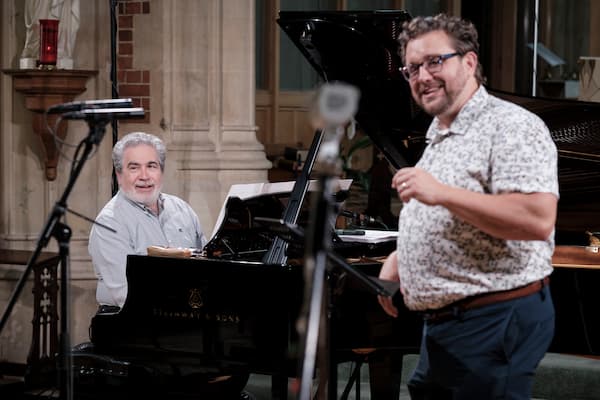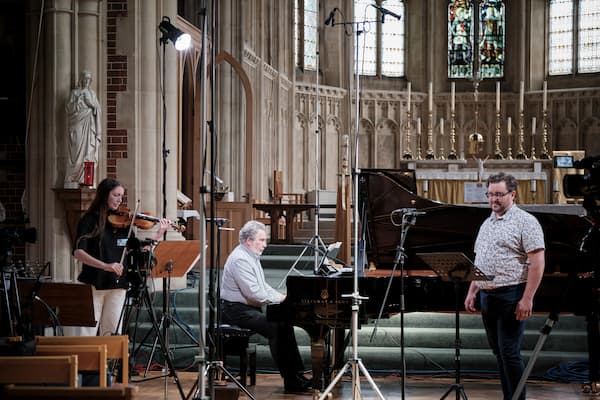‘A Musical Hope That Endures Through Everything’

Michael Spyres © Andie Bottrell
American tenor Michael Spyres’ formidable career has taken him all over the globe, performing over 83 roles in 73 operas. His star-studded list of collaborators and jam-packed concert schedule keep him busy with some of the largest roles on the grandest stages in the opera and concert worlds, including the Concertgebouw, Barbican Centre, Opéra National de Paris, Bayreuth Festival and the Metropolitan Opera in New York, to name but a few.
The focus of our chat, however, is something decidedly more intimate in scale: the release of a new album of lieder penned by perhaps rather an unexpected composer. Known more for his large-scale operas than small chamber works, these are the recently discovered songs of Gaetano Donizetti.
“Oh! ne me chasse pas” | Gaetano Donizetti | Michael Spyres tenor & Carlo Rizzi piano
This album of lieder, featuring songs in Italian, French and German, was brought into the world courtesy of Opera Rara, a company specialising in unearthing hidden and forgotten gems of the repertoire. Michael’s album is the third album in a multi-volume release exploring the forgotten works of this great operatic innovator.
Michael is an Opera Rara (OR) Artist Ambassador. I talk to him about the journey of discovering these long-forgotten songs, his relationship to Donizetti and opera more widely, and how these songs can also offer hope in a time of global uncertainty.
How did the Donizetti song project come about?
Roger Parker (OR’s repertoire consultant) had been reading in certain books for years that Donizetti was a prolific lieder writer. Roger went to different venues, including some monasteries, and discovered these pieces, which were fabled to exist. He must have felt like Indiana Jones, going to the back of the archives and then uncovering these pieces! That’s a dream.
He had to do quite a bit of research to make sure they were authentic, but over 200 of these pieces were authentic Donizetti, most of which had never been heard to this day. I find it fascinating because everyone knows Donizetti, but there is a whole other side of this composer that you get to discover with this kind of lieder.
What do you feel you have discovered about Donizetti by participating in this project?

Michael Spyres and Carlo Rizzi © Russell Duncan
When lieder were coming about around that time (the early 19th century), it wasn’t such a big thing, and it was really for private concerts, or the composers themselves.
They wrote operas to make money, to get the prowess and all of that, but these songs are so intimate, and you find a different facade of the personality of Donizetti within, and that’s why I’m so happy to be a part of it.
Tell us more about this side of Donizetti that we might be less familiar with.
I love opera, but it is larger than life, and that’s the whole point of it. With these songs, they’re so intimate that you really feel that it’s just chamber music, purely making music for oneself, not in a performative way.
Donizetti was one of the melodic masters who wrote some of the greatest, most beautiful melodies of all time, and to get to do that in such an intimate setting was like having a different connection to the composer. I know that I’m one of the only people in the world who’s ever gotten to sing these songs, and Donizetti might never have even heard them himself.
Has discovering these songs changed your own relationship to Donizetti?
I have a friend who collects old memorabilia, in particular old letters. It’s all well and good to read things on a computer, but there’s a disconnect. If you have an actual paper that someone wrote, you know that that’s their DNA, that their skin particles are probably still there! You’re holding that same thing from hundreds of years ago, and that’s what it felt like, this direct connection to Donizetti, and getting to bring these songs to life was such a joy.
I think that’s why it’s resonating with a lot of people, because it is different to a lot of his other music. They are pure lieder – they are really, really great, and they should start to become part of the canon.
A lot of Italian lieder were overshadowed by German lieder, and rightly so, because there was a codified way of lieder in the German system. However, some of the greatest French and Italian lieder I’ve ever come across are from Donizetti. They are true, meaningful, and have drama – the really long 13-minute soliloquy on the album, Demain quand sonnera l’heure, has every bit of drama as Schubert’s Erlkönig.
It’s so interesting, and I think people are starting to realise he was a lot more of a genius than people give him credit for. With just the voice and an accompaniment, it’s so intimate. You can really focus on the beauty of the line, the beauty of the text, and the poetry.
Have you noticed any similarities to Donizetti’s operatic writing in these more intimate songs?

Eloise-Fleur Thom, Michael Spyres and Carlo Rizzi © Russell Duncan
I’m kind of known for doing all the crazy things that nobody else knows, but delving into Donizetti is really a lifelong process. He was so prolific. He wrote over 73 operas, and we basically know 3 or 4 of them.
Going back to his earlier things, seeing when he wrote these lieder, and then lining them up with his operas, you can see how Donizetti was developing certain melodies and ways of expression with the voice. At his time, the vocal technique was really changing, and he was one of the people who helped it.
Donizetti, Rossini, Berlioz and Bellini were some of the first people who were shapeshifting and forcing the voice into a different, more grandiose way of sound production. Especially during Donizetti’s lifetime, the vocal apparatus and the way that people used their voice for the opera were rapidly changing.
Opera became this huge revolutionary institution in the 1830s when Donizetti was in his heyday, and that’s when this whole technique of needing to project over an ever-growing orchestra arose, so the way that people used their instrument was very different from the time he was starting to the time he ended.
You see the same pattern along with his lieder. He would make even longer phrases for more expression, rather than short, cutesy ones from earlier times when he was more known for his comic operas and smaller works. They didn’t have these long lines that were there when he was finishing up in the French grand style, so you can see the direct lineage from the lieder to the opera, and I just find it fascinating, not only from a vocal standpoint but also from the history of how the voice has been written for.
One of the interesting things for me is that people don’t realise that there was a 20-year transitionary period from what we thought of vocal technique to the modern technique, and it took a long time to kind of switch over, but that’s what allowed verismo opera and Wagner and Verdi to flourish, because of this transitionary period. Donizetti was one of the main figures who changed how we use the instrument by the way he wrote for it.
I love these songs because they’re right at this precipice – you can see the echoes of the past while going towards something new, and people, whether they realise it or not, were copying a lot of Donizetti’s techniques because he was so popular in his time.
Berglied “Rings ruht die grüne Alpenhut” | Gaetano Donizetti | Michael Spyres & Carlo Rizzi
Do you have a favourite song on the album?
I really loved Rings ruht die grune Alpenhut, the German lied that Donizetti wrote. When I sang it for people, they didn’t realise it was Donizetti. He took a beautiful German Alpenlied, this kind of almost yodel, and turned it into this gorgeous little piece.
All of these are so much fun, but I do have to say that the one that’s the strongest, that really has drama, is Si tu m’a fait a ton image. You go into the depths of asking yourself if life is worth living.
It’s odd because a lot of people don’t like to talk about that, but it was a very big thing, especially at the time of the Romantics. Suicide became a national and international topic. There’s a great show called Radiolab in the United States, and they talk about music and psychological phenomena around the world. One of these phenomena, especially during this Romantic time, was the romanticism around suicide.
It seems like we’re going through now what they were going through back then. It’s a 150-year cycle of society and art trying to reflect on what comes next. You’re seeing some of the greatest innovations and greatest people coming about, but also some of the terrible things rearing their heads.
What helps you in these times of global upheaval and change?
One of my favourite books that helped ground me about 10 years ago was by Steven Pinker, a wonderful Canadian philosopher and psychologist. He is an atheist, but he titled his book The Better Angels of our Nature. It’s really fact-heavy, about 400 pages of lots of facts showing how our society is actually getting way better. We’re inundated with things saying everything is getting worse, but compared to the actual numbers, we are getting so much better progressively.
So many of these songs go to the depths of emotion, but then there’s that spark of light, and that’s what romanticism is about, this hope, hope that endures through everything, and that’s what I want people to hear in this music.
Donizetti Songs Vol.3 can be found here.
Michael Spyres sings Latilla: Siroe, re di Persia, Act 1: “Se il mio paterno amore”
For more of the best in classical music, sign up for our E-Newsletter




